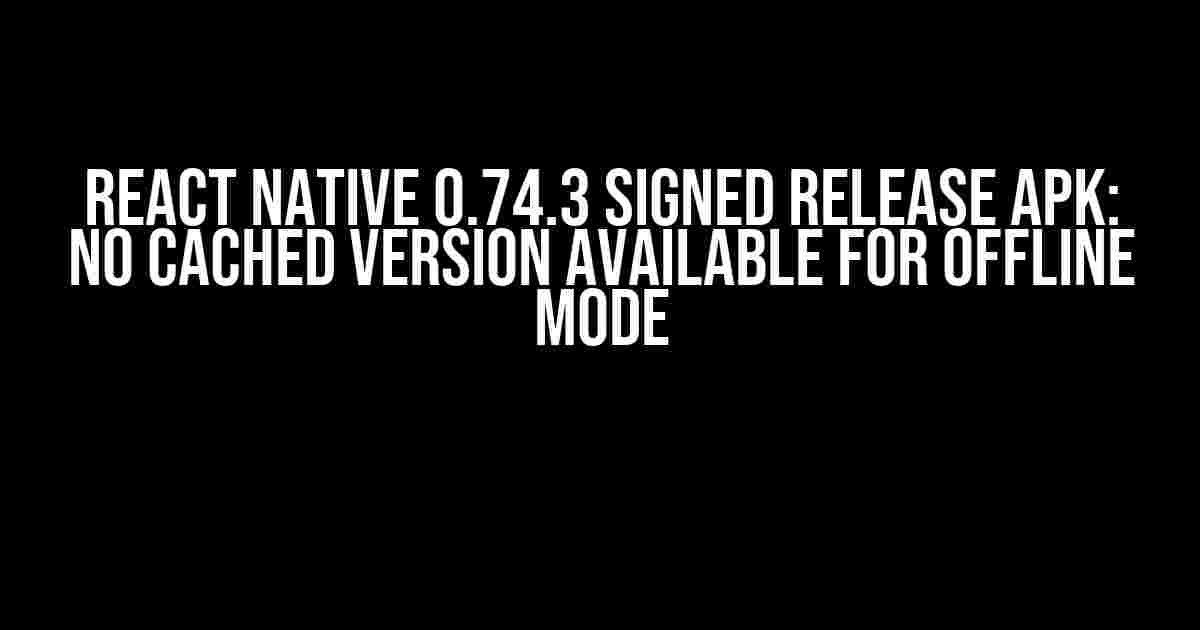Welcome to our comprehensive guide on resolving the “No cached version available for offline mode” issue in React Native 0.74.3 signed release APK. This error can be frustrating, especially when you’re trying to deploy your app to the Google Play Store. Fear not, dear developer, for we’ve got you covered!
Understanding the Issue
The “No cached version available for offline mode” error occurs when React Native’s bundler is unable to find a cached version of your app’s JavaScript bundle. This typically happens when you’re trying to generate a signed release APK for your app.
But why does this happen? Well, it’s because React Native’s bundler is designed to work in online mode by default. When you’re generating a signed release APK, you’re essentially telling React Native to work in offline mode. And that’s where the trouble begins!
Step-by-Step Solution
Don’t worry, we’ve got a solution for you! Follow these steps to resolve the “No cached version available for offline mode” issue in React Native 0.74.3 signed release APK:
-
Update your `react-native` version to the latest (0.74.3 or higher) by running the following command:
npm install react-native@latest -
Open your `android/app/build.gradle` file and add the following code:
android { ... defaultConfig { ... bundlertasks { bundleReleaseJsAndAssets { inputs.files fileTree(dir: 'src/main/jsbundle') outputs.dir file('src/main/assets') } } } ... } -
Create a new file called `bundle-config.js` in your project’s root directory with the following code:
module.exports = { // Enable bundling in offline mode offline: true, }; -
Update your `android/app/build.gradle` file to include the new `bundle-config.js` file:
android { ... defaultConfig { ... bundlertasks { bundleReleaseJsAndAssets { inputs.files fileTree(dir: 'src/main/jsbundle') outputs.dir file('src/main/assets') // Add this line config file('bundle-config.js') } } } ... } -
Run the following command to generate a signed release APK:
cd android && ./gradlew assembleRelease
Understanding the Solution
So, what’s happening behind the scenes? Let’s break it down:
-
We updated our `react-native` version to the latest (0.74.3 or higher) to ensure we have the latest bundler version.
-
We added a new task to our `android/app/build.gradle` file to enable bundling in offline mode. This task uses the `bundleReleaseJsAndAssets` configuration to generate a JavaScript bundle in offline mode.
-
We created a new `bundle-config.js` file to enable bundling in offline mode. This file is used by the React Native bundler to configure the bundling process.
-
We updated our `android/app/build.gradle` file to include the new `bundle-config.js` file. This ensures that the bundler uses the correct configuration when generating the signed release APK.
-
Finally, we ran the `assembleRelease` command to generate a signed release APK using the updated configuration.
Troubleshooting Common Issues
While following the above steps should resolve the “No cached version available for offline mode” issue, you might encounter some common issues. Here are some troubleshooting tips to help you out:
| Issue | Solution |
|---|---|
| Failed to generate JavaScript bundle | Check your `bundle-config.js` file for syntax errors. Make sure the file is in the correct location and is being referenced correctly in your `android/app/build.gradle` file. |
| APK generation fails with an error | Check your `android/app/build.gradle` file for syntax errors. Make sure you’ve updated the `bundlertasks` configuration correctly. |
| Bundle size is too large | Optimize your JavaScript code by reducing unnecessary dependencies and compressing your code using tools like Brotli or Gzip. |
Conclusion
And that’s it! You should now have a signed release APK for your React Native 0.74.3 app. Remember to update your `react-native` version, add the necessary configuration to your `android/app/build.gradle` file, and create a new `bundle-config.js` file to enable bundling in offline mode.
If you encounter any issues, refer to our troubleshooting section for common solutions. Happy coding, and we hope to see your app on the Google Play Store soon!
Remember to optimize your app for a better user experience, and don’t hesitate to reach out if you need further assistance.
Additional Resources
For more information on React Native and bundling, check out these resources:
Frequently Asked Question
Having trouble with REACT NATIVE 0.74.3 Signed Release APK? Don’t worry, we’ve got you covered! Check out these frequently asked questions to get back on track.
What is the “No cached version available for offline mode” error?
The “No cached version available for offline mode” error occurs when React Native can’t find a cached APK for the current configuration. This usually happens when you’re building an APK for release and don’t have an internet connection.
Why does React Native need internet connection for building APK?
React Native needs an internet connection to fetch the necessary dependencies and assets required for building the APK. When you run the `gradle bundleRelease` or `gradle assembleRelease` command, it downloads the necessary files from the Google CDN and caches them locally.
How can I build an APK offline?
To build an APK offline, you need to pre-download the dependencies and assets by running the `gradle bundleRelease` or `gradle assembleRelease` command with an internet connection. This will cache the necessary files locally. Then, you can disconnect from the internet and run the command again to build the APK offline.
What if I’m still facing issues with caching?
If you’re still facing issues with caching, try deleting the `.gradle` directory and the `node_modules` directory, and then run the `npm install` or `yarn install` command to reinstall the dependencies. This should refresh the cache and resolve any issues.
Is there a way to force React Native to use the cached APK?
Yes, you can force React Native to use the cached APK by adding the `–offline` flag to the `gradle bundleRelease` or `gradle assembleRelease` command. This will tell Gradle to use the cached dependencies and assets instead of trying to download them from the internet.
